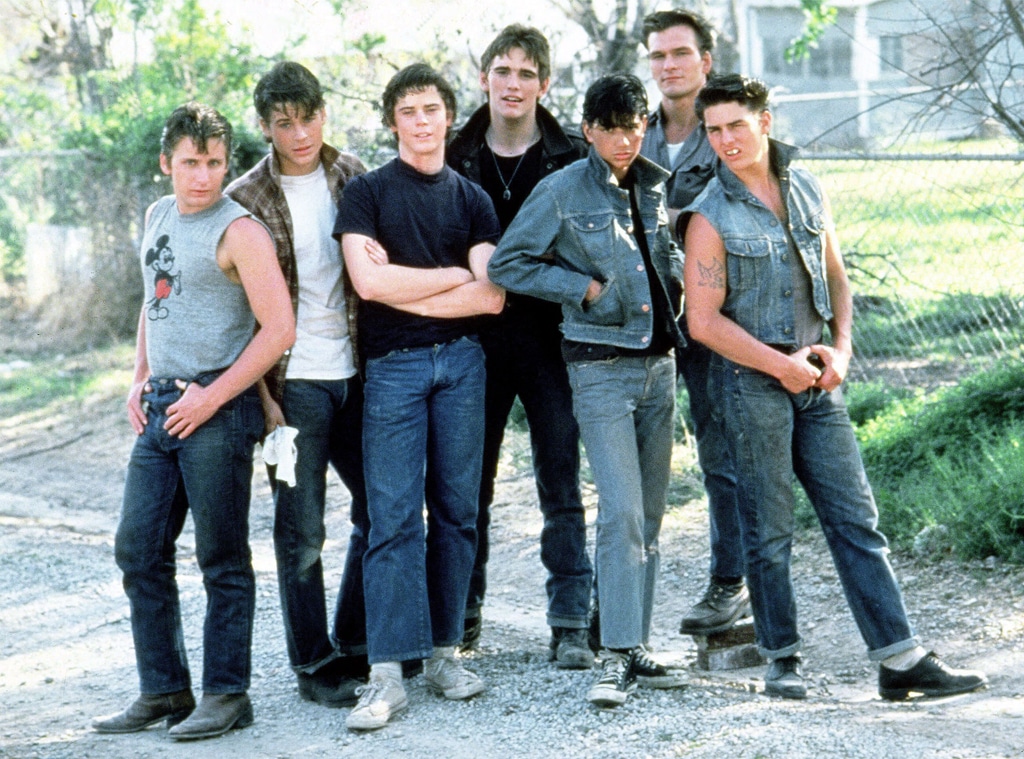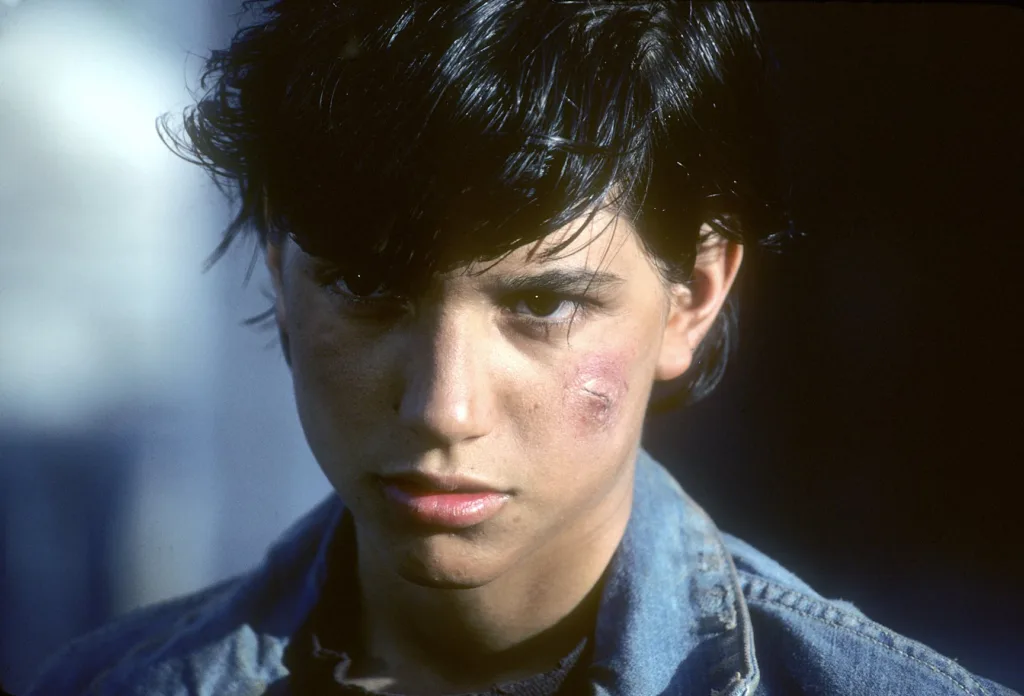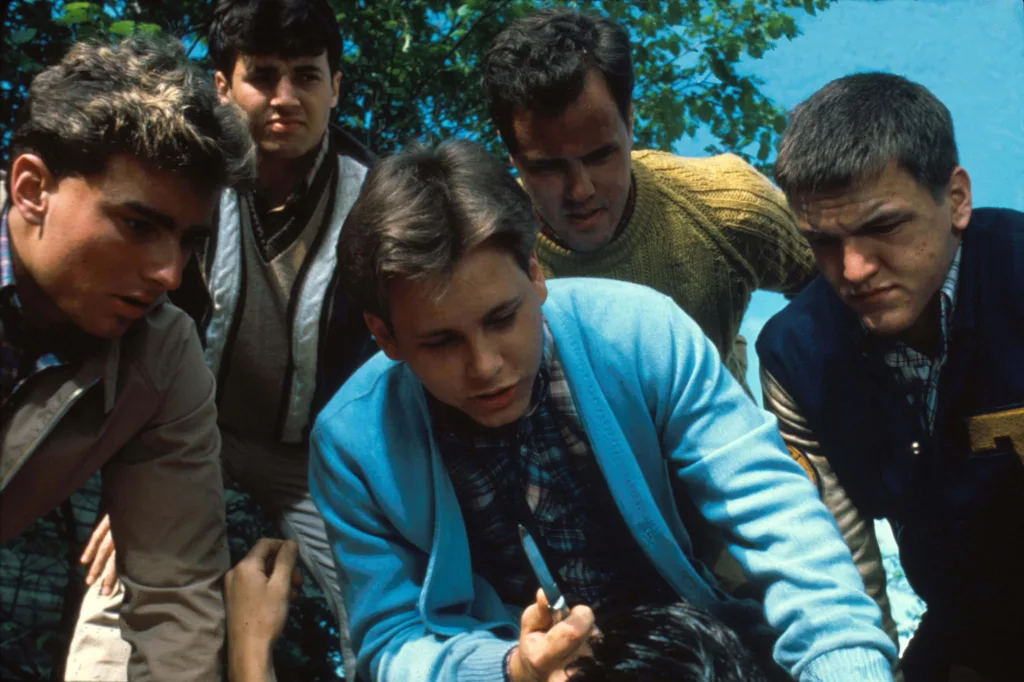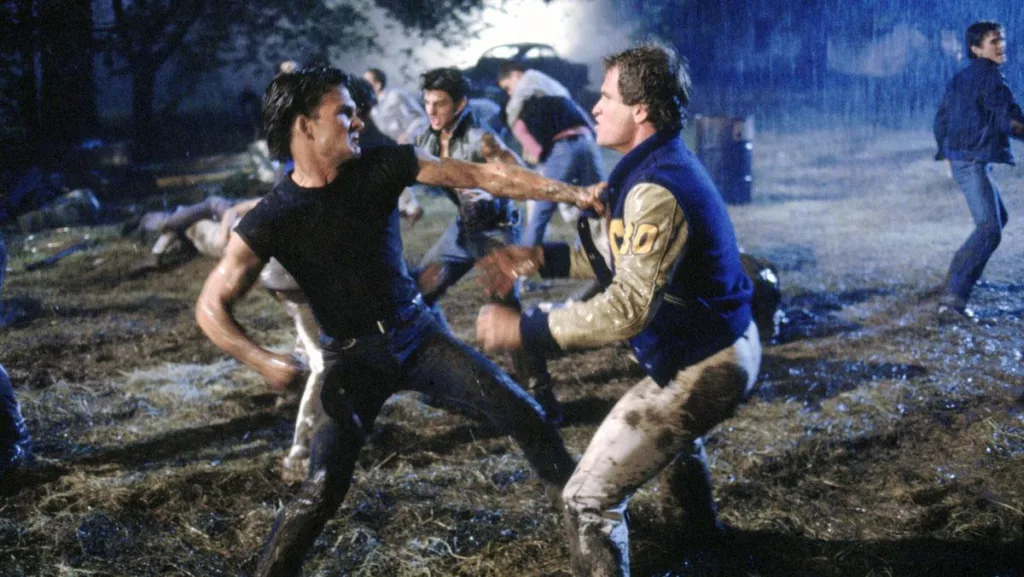The Outsiders is a classic novel that explores the differences between two rival gangs in a small town in Oklahoma. The Greasers and the Socs are two groups that are divided by their social class, their clothing, and their values. In this blog post, we will delve deeper into the world of the Greasers and the Socs, and explore the reasons behind their rivalry.
The Greasers are a group of young men who come from working-class families. They are often seen as the underdogs in society, with few opportunities for advancement. They wear leather jackets, listen to rock music, and are not afraid to fight for what they blieve in. The Greasers value loyalty, friendship, and family above all else. They are willing to risk everything to protect their loved ones, and they are fiercely protective of their territory.
The Socs, on the other hand, are the polar opposite of the Greasers. They come from wealthy families, wear expensive clothes, and have access to all the advantages that come with their social status. They are seen as the “cool kids” in school, with the latest gadgets and the best cars. The Socs are not afraid to flaunt their wealth and power, and they often use their influence to bully those who are weaker than them. They value conformity, social status, and material possessions.
The rivalry between the Greasers and the Socs is fueled by their social and economic differences. The Greasers feel like they are constantly fighting an uphill battle, with few opportunities for success. They are often looked down upon by the Socs and other members of society, and they feel like they are always on the outside looking in. The Socs, on the other hand, see the Greasers as a threat to their social status. They feel like the Greasers are trying to take away what they have worked hard to achieve, and they are not willing to let that happen.
The two groups clash in a variety of ways, but most often through physical violence. The Greasers and the Socs have a long-standing tradition of “rumbling,” which is essentially a street fight between the two groups. The rumble is often used as a way to settle disputes, and it is seen as a test of strength and courage. Both sides are willing to fight to the death to protect their honor and their turf.
The rivalry between the Greasers and the Socs is a complex one, rooted in social and economic differences. The Greasers value loyalty, friendship, and family, while the Socs value conformity, social status, and material possessions. The two groups clash in a variety of ways, but most often through physical violence. Despite their differences, however, both the Greasers and the Socs are fundamentally human, with hopes, dreams, and fears. The Outsiders is a poignant reminder that our differences need not define us, and that we all have the capacity for kindness, understanding, and compassion.
Outcome of the Socs vs. Greasers Conflict
In the novel “The Outsiders” by S.E. Hinton, a rumble takes place between the Socs and the Greasers. The rumble is a physical fight where both sides try to prove their worth and dominance. In this rumble, the Greasers emerge as the victors.
The victory of the Greasers can be attributed to the fact that the Socs ran away first. Additionally, the Greasers had a strong fighter in Dally, who showed up to the rumble despite having only one arm. Dally’s presence and fighting skills were important for the Greasers’ success.
It is worth noting that both sides suffered injuries during the rumble. However, the Greasers ultimately won, whih was a significant achievement for them.
To summarize, in the rumble between the Socs and the Greasers in “The Outsiders,” the Greasers emerged as the winners. Their victory can be attributed to the fact that the Socs ran away first and the presence of a strong fighter in Dally.

The Reasons Behind the Socs’ Hatred of the Greasers
The Socs, short for Socials, and the Greasers are two rival gangs in the nvel “The Outsiders” by S.E. Hinton. The Socs are portrayed as the wealthier, more privileged group, while the Greasers are depicted as the poorer, more working-class group. The hate between the two gangs stems from several factors.
Firstly, the Socs hate the Greasers because of their appearance. The Greasers have a distinctive style, with greased hair, leather jackets, and denim jeans. The Socs, on the other hand, wear preppy clothes and have a cleaner, more polished look. The Socs view the Greasers as dirty and dangerous, while they see themselves as sophisticated and refined.
Secondly, the Socs dislike the Greasers because of their socioeconomic status. The Greasers come from poorer backgrounds and often live in run-down neighborhoods. The Socs, on the other hand, come from wealthy families and live in nicer areas of town. The Socs see themselves as superior to the Greasers, and look down on them because of their lack of money and resources.
The Socs hate the Greasers simply because they can. The two gangs have a long-standing rivalry, and violence between them is commonplace. The Socs see the Greasers as an easy target, and often attack them simply for the thrill of it. The Greasers, in turn, resent the Socs for their sense of entitlement and their willingness to use violence to get what they want.
The hate between the Socs and the Greasers is fueled by a combination of factors, including appearance, socioeconomic status, and a long-standing rivalry. The two groups represent different worlds, and their differences are a constant source of tension and conflict.
Is Ponyboy a Soc or a Greaser?
Ponyboy Curtis is a member of the “greasers” gang, not a “Soc”. The story of “The Outsiders”, written by S.E. Hinton, is set in the 1960s in Tulsa, Oklahoma, where two rival gangs, the greasers and the Socs, are constantly at odds with each other.
The greasers are a group of working-class teenagers who come from broken homes and are often associated with delinquent behavior. They are kown for their long hair, leather jackets, and love for rock music. On the other hand, the Socs are the wealthy, privileged kids from the West side of town who drive fancy cars and wear expensive clothes.
Ponyboy and his brothers Darry and Sodapop are all members of the greasers gang. They live in poverty and have to fend for themselves, often resorting to petty crime to survive. However, they also have a strong sense of loyalty and family values, which is evident in the way they protect each other from harm.
Ponyboy Curtis is a greaser, not a Soc. His life is defined by poverty, violence, and a sense of camaraderie with his fellow gang members. Despite the challenges he faces, Ponyboy remains a sympathetic and relatable character who ultimately learns the importance of empathy and understanding.
Differences Between Greasers and Socs According to Ponyboy
In the novel “The Outsiders” by S.E. Hinton, the main character Ponyboy observes the differences between the two groups, the Greasers and the Socs. The Greasers are from the lower socio-economic class, while the Socs are from the upper class. Ponyboy notes that one of the main differences between the two groups is the way they express thir emotions. The Socs, who are seen as “cool,” tend to suppress their emotions and avoid talking about them. On the other hand, the Greasers tend to feel emotions more strongly and are not afraid to express them.
Another difference between the two groups is the way they interact with each other. The Socs tend to be more exclusive and only socialize with people from their own social class. Meanwhile, the Greasers are more accepting of people from different backgrounds and tend to stick together as a group.
Despite their differences, Ponyboy realizes that he and Cherry, a Soc girl, have something in common. They both appreciate the beauty of the sunset and can enjoy it together, regardless of their social class. This suggests that even though there are differences between the Greasers and the Socs, there is still potential for understanding and connection between them.
Johnny’s Final Words
Johnny’s final words, “Stay gold, Ponyboy,” have great significance in the novel “The Outsiders” by S.E. Hinton. The phrase “stay gold” is taen from a poem by Robert Frost, which describes the beauty and innocence of youth. It represents the idea of holding onto one’s pure and innocent nature despite the harsh realities of life.
Johnny’s character is one that has been greatly affected by the violence and poverty of his surroundings, and he sees Ponyboy as someone who still has the chance to maintain his innocence. By telling Ponyboy to “stay gold,” Johnny is urging him to hold onto his youthful spirit and not let the harshness of life change him.
Initially, Ponyboy does not understand the meaning of Johnny’s words, but he later discovers a letter that Johnny left for him, which explains their significance. In the letter, Johnny explains that he feels Ponyboy is special because he sees the beauty in the world and has the potential to make a positive impact.
Johnny’s final words serve as a reminder that despite the difficulties and hardships of life, it is important to hold onto one’s innocence and maintain a positive outlook.

Death of Greasers in The Outsiders
In the novel The Outsiders by S.E. Hinton, one of the Greasers, Johnny Cade, dies from injuries sustained during a rumble with the rival gang, the Socs. Johnny was severely beaten by the Socs and suffered a broken back as well as severe burns. Despite the efforts of the medical staff at the hospital, Johnny’s injuries were too severe and he passed away shortly after telling his friend Ponyboy Curtis to “stay gold.”
Johnny’s death is a significant event in the novel as it serves as a catalyst for the resolution of the conflict beween the Greasers and the Socs. It also highlights the harsh realities of gang violence and the tragic consequences that can result from it.
In addition to Johnny, several other characters in the novel also die, including Bob Sheldon, a member of the Socs who is killed by Johnny in self-defense, and Dally Winston, another Greaser who is killed by police after robbing a convenience store. These deaths further emphasize the brutal and unforgiving nature of the world in which the characters live.
Did the Socs Attempt to Drown Ponyboy?
In the novel “The Outsiders” by S.E. Hinton, the character Ponyboy is indeed almost drowned by the Socs. The incident takes place near a fountain where Johnny and Ponyboy were caught by a group of Socs. Ponyboy is pushed into the fountain and repeatedly dunked, causing him to struggle and almost drown. It is important to note that while Ponyboy was in danger of drowning, he was ultimately able to get out of the fountain and survive the attack.
It shuld be noted that the Socs were not successful in drowning Ponyboy. However, the event was still a traumatic experience for the character and played a significant role in the development of the story’s plot. Additionally, the attack led to Johnny using his switchblade to defend himself and ultimately resulted in the death of one of the Socs, Bob.
While Ponyboy was not drowned by the Socs, the incident was still a pivotal moment in the novel and had lasting effects on the characters involved.
The Significance of Greasers Cutting Their Hair
In the novel “The Outsiders” by S.E. Hinton, the Greasers, a group of young boys from the wrong side of town, were often subjected to prejudice and discrimination due to their appearance. In an effort to blend in and disguise their appearances, Johnny and Ponyboy cut and bleached their hair.
The act of cutting their hair was significant as it symbolized their willingness to change and adapt to their environment. By altering their physical appearance, they hoped to avoid drawing unwanted attention to themselves and prevent any further altercations with the Socs, a rival gang.
Furthermore, the Greasers’ hair was a defining characteristic of their subculture, and by cutting it, they were also shedding their identity as outcasts and outsiders. It was a way for them to distance themselves from the negative stereotypes associated with their appearance and prove that they were more than just their looks.
In addition to its symbolic meaning, cutting their hair also had a practical purpose. With shorter hair, they could avoid gettng pulled by their hair during fights, which was a common tactic used by the Socs to gain an advantage.
The decision to cut their hair was a strategic move by the Greasers to protect themselves and adapt to their hostile environment. It was a significant turning point in the novel, marking the beginning of their transformation and journey towards self-discovery.
Feelings of the Socs
The Socs, as depicted in the novel “The Outsiders” by S.E. Hinton, exhibit a distinct lack of strong emotions. They are often described as cool, detached, and almost robotic in their demeanor. This emotional detachment is likely due to their privileged upbringing and social status, which affords them a cetain level of comfort and security that the working-class greasers do not have.
Unlike the greasers, who are often driven by their strong emotions of anger, fear, and loyalty to their friends and family, the Socs seem to lack a strong sense of identity or purpose. They do not have a clear sense of who they are or what they stand for, and as a result, they often engage in reckless and destructive behavior.
While the Socs may experience some level of emotion, it is often muted or suppressed. They may feel boredom, dissatisfaction, or ennui, but they do not allow themselves to fully experience or express these emotions. This emotional detachment is a key characteristic of the Socs and sets them apart from the greasers, who are often passionate and deeply connected to their emotions and experiences.

Is Johnny Cade a Greaser or a SOC?
Johnny Cade is a member of the greasers gang in S.E. Hinton’s novel “The Outsiders.” Greasers are a group of working-class teenagers who are known for their long, greased hair and tough exterior. They are often at odds with the affluent “Socs” (short for Socials), who represent the wealthy and privileged.
Johnny’s character is clearly defined as a greaser throughout the novel. He is one of the youngest members of the gang and is often seen as vulnerable due to his small stature and timid personality. However, he is fiercely loyal to the greasers and will do whatever it takes to protect his friends and fellow gang members.
Despite his loyalty to the greasers, Johnny does not fully embrace the tough exterior that is often associated with the gang. He is kind-hearted and empathetic, which sets him apat from many of the other greasers. This makes him an easy target for the Socs, who often bully and harass him.
Johnny Cade is a greaser in “The Outsiders” and is a significant member of the gang. While he may not fit the traditional mold of a greaser, his loyalty and dedication to the group make him an important part of their community.
Is Ponyboy from The Outsiders a Female?
Ponyboy Curtis is not a girl in The Outsiders. Ponyboy is a male character and is referred to using male pronouns throughout the novel. Despite his name, which may be considered gender-neutral, it is made clear through the narrative that Ponyboy identifies as a boy. The confusion about Ponyboy’s gender may stem from his appearance, which is described as having long, “light-brown, almost-red hair” and “big, greenish-gray eyes.” However, his gender is never in question, and he is consistently portrayed as a young boy growing up in a tough and violent world.
Ponyboy’s Love
Ponyboy, the protagonist of S.E. Hinton’s novel “The Outsiders,” is a unique character who stands out from his group of greaser friends. While his peers are characterized as tough and rebellious, Ponyboy has a softer side that is reflected in the things he loves.
One of Ponyboy’s greatest passions is reading books. He is often seen with his nose buried in a novel, and he even recites Robert Frost’s poem “Nothing Gold Can Stay” to his friend Johnny. This love of literature sets Ponyboy apart from his gang and gives him a different perspective on the world around him.
In addition to reading, Ponyboy also has an appreciation for nature. He loves to watch sunsets and descries them in vivid detail, showing his sensitivity to the beauty of the world. This love of nature is also reflected in his recitation of Frost’s poem, which deals with the fleeting nature of beauty and the impermanence of life.
Ponyboy’s loves of literature and nature show his unique character and set him apart from his peers. These passions give him a different perspective on the world and allow him to see beyond the violence and turmoil of his surroundings.
Characteristics of Socs and Greasers
In the novel “The Outsiders” by S.E. Hinton, the Socs and Greasers are two distinct groups of teenagers who live in the same town but come from different socioeconomic backgrounds. The Socs, short for the Socials, are the wealthy and privileged group of teenagers who have everything they want at their disposal. They are often seen wearing preppy clothes, driving fancy cars, and attending exclusive parties. Their parents are successful businessmen and women who have well-established connections in the community.
On the other hand, the Greasers are the poorer, working-class group of teenagers who come from broken homes and struggle to make ends meet. They typically wear leather jackets, have long hair, and ride motorcycles. They are often viewed as troublemakers and are looked down upon by the Socs and the rest of the community. The Greasers often feel like they are outsiders in their own town and have to rely on each other for support.
One of the most significant differences between the Socs and the Greasers is their economic status. The Socs come from wealthy families and have access to resources that the Greasers do not. This divide creates social and cultural differences that often lead to conflicts between the two groups. The Socs have a sense of entitlement and feel superior to the Greasers, while the Greasers feel like they are constantly fighting an uphill battle to be accepted and respected.
Another difference between the two groups is their behavior. The Socs are often seen as arrogant and entitled, while the Greasers are more down-to-earth and authentic. The Socs tend to engage in reckless behavior, such as drinking and driving, while the Greasers are more lkely to engage in petty crime and vandalism. These differences in behavior reflect the different environments in which each group has grown up.
The Socs and Greasers are two distinct groups of teenagers in “The Outsiders” who come from different socioeconomic backgrounds. The Socs are the wealthy and privileged, while the Greasers are the poorer, working-class group. The two groups have different behaviors and attitudes, which often lead to conflicts between them.

The Causes of Conflict Between Greasers and Socs
The Greasers and Socs fighting is the central conflict in S.E. Hinton’s novel, The Outsiders. The reasons behind this rivalry are rooted in their social status and lifestyles.
The Greasers are a group of young men from the East Side of town who come from low-income families. They are known for their long hair, leather jackets, and tough attitudes. On the other hand, the Socs are from the West Side of town and come from wealthy families. They are known for their preppy style, expensive cars, and parties.
The differences in their socioeconomic status create tension and competition between the two groups. The Socs oftn look down on the Greasers, seeing them as inferior due to their lack of money and social status. The Greasers, in turn, resent the Socs for their privilege and the advantages they have in life.
The conflict between the two groups is also fueled by acts of violence and aggression. The Socs often pick on the Greasers, assaulting them and vandalizing their homes and cars. In response, the Greasers band together and fight back, creating a cycle of violence and retaliation.
Additionally, the novel suggests that the tension between the two groups is also a result of a lack of understanding and empathy. The characters on both sides of the conflict struggle to see beyond their own experiences and understand the lives and struggles of those who are different from them.
The Greasers and Socs fight due to their different social statuses, lifestyles, and a lack of understanding and empathy between the two groups.
The Greasers and Socs’ Term for a Fight
In the context of S. E. Hinton’s novel “The Outsiders,” the Greasers and Socs refer to a physical altercation as a “rumble.” This term is used to describe a violent clash between the two rival gangs, which often involves the use of weapons and results in serious injuries.
It is important to note that the term “rumble” is specific to the world of the novel and is not a commonly used term otside of it. However, the concept of gang violence and inter-gang conflict is unfortunately a real-world issue that has plagued many communities throughout history.
In the novel, the Greasers and Socs engage in several rumbles, each one escalating in violence and danger. The rumble is seen as a way for the two groups to settle their differences and assert their dominance over one another. However, as the novel progresses, it becomes clear that the violence and aggression of the rumbles only serve to perpetuate the cycle of hatred and animosity between the two groups.
The term “rumble” is used by the Greasers and Socs to describe a physical fight between the rival gangs in S. E. Hinton’s novel “The Outsiders.” While this term is specific to the novel, the issue of gang violence and inter-gang conflict is unfortunately a real-world problem that has impacted many communities throughout history.
Conclusion
The social divide between the Greasers and Socs in S.E. Hinton’s “The Outsiders” is a significant theme that resonates throughout the book. While both groups may share similar emotions and experiences, their lifestyles, attitudes, and behaviors differ significantly. The Greasers are portrayed as tough, loyal, and struggling with poverty, while the Socs are portrayed as affluent, privileged, and entitled.
The rumble between the two gangs highlights the violent nature of their rivalry, but it also showcases the solidarity and loyalty within the Greaser gang. Despite their differences, Ponyboy realizes that they share a common humanity with the Socs, as they both appreciate the beauty of a sunset.
The nvel explores the consequences of social class and the impact it has on one’s life. The Greasers are constantly battling against stereotypes and prejudice while fighting for survival, whereas the Socs’ wealth and privilege allow them to escape the harsh realities of life.
“The Outsiders” highlights the stark differences between the Greasers and Socs, but it also reveals the common humanity that lies beneath the surface. The book serves as a reminder that social class should not define one’s worth, and that empathy and understanding can bridge even the widest social divides.
